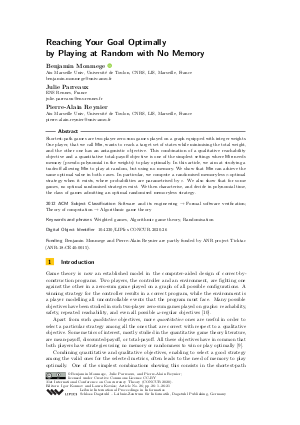Reaching Your Goal Optimally by Playing at Random with No Memory
Authors
Benjamin Monmege  ,
Julie Parreaux,
Pierre-Alain Reynier
,
Julie Parreaux,
Pierre-Alain Reynier
-
Part of:
Volume:
31st International Conference on Concurrency Theory (CONCUR 2020)
Part of: Series: Leibniz International Proceedings in Informatics (LIPIcs)
Part of: Conference: International Conference on Concurrency Theory (CONCUR) - License:
 Creative Commons Attribution 3.0 Unported license
Creative Commons Attribution 3.0 Unported license
- Publication Date: 2020-08-26
File

PDF
LIPIcs.CONCUR.2020.26.pdf
- Filesize: 0.59 MB
- 21 pages
Document Identifiers
Subject Classification
ACM Subject Classification
- Software and its engineering → Formal software verification
- Theory of computation → Algorithmic game theory
Keywords
- Weighted games
- Algorithmic game theory
- Randomisation
Metrics
- Access Statistics
-
Total Accesses (updated on a weekly basis)
0PDF Downloads0Metadata Views
Abstract
Shortest-path games are two-player zero-sum games played on a graph equipped with integer weights. One player, that we call Min, wants to reach a target set of states while minimising the total weight, and the other one has an antagonistic objective. This combination of a qualitative reachability objective and a quantitative total-payoff objective is one of the simplest settings where Min needs memory (pseudo-polynomial in the weights) to play optimally. In this article, we aim at studying a tradeoff allowing Min to play at random, but using no memory. We show that Min can achieve the same optimal value in both cases. In particular, we compute a randomised memoryless ε-optimal strategy when it exists, where probabilities are parametrised by ε. We also show that for some games, no optimal randomised strategies exist. We then characterise, and decide in polynomial time, the class of games admitting an optimal randomised memoryless strategy.
Cite As Get BibTex
Benjamin Monmege, Julie Parreaux, and Pierre-Alain Reynier. Reaching Your Goal Optimally by Playing at Random with No Memory. In 31st International Conference on Concurrency Theory (CONCUR 2020). Leibniz International Proceedings in Informatics (LIPIcs), Volume 171, pp. 26:1-26:21, Schloss Dagstuhl – Leibniz-Zentrum für Informatik (2020)
https://doi.org/10.4230/LIPIcs.CONCUR.2020.26
BibTex
@InProceedings{monmege_et_al:LIPIcs.CONCUR.2020.26,
author = {Monmege, Benjamin and Parreaux, Julie and Reynier, Pierre-Alain},
title = {{Reaching Your Goal Optimally by Playing at Random with No Memory}},
booktitle = {31st International Conference on Concurrency Theory (CONCUR 2020)},
pages = {26:1--26:21},
series = {Leibniz International Proceedings in Informatics (LIPIcs)},
ISBN = {978-3-95977-160-3},
ISSN = {1868-8969},
year = {2020},
volume = {171},
editor = {Konnov, Igor and Kov\'{a}cs, Laura},
publisher = {Schloss Dagstuhl -- Leibniz-Zentrum f{\"u}r Informatik},
address = {Dagstuhl, Germany},
URL = {https://drops.dagstuhl.de/entities/document/10.4230/LIPIcs.CONCUR.2020.26},
URN = {urn:nbn:de:0030-drops-128381},
doi = {10.4230/LIPIcs.CONCUR.2020.26},
annote = {Keywords: Weighted games, Algorithmic game theory, Randomisation}
}
Author Details
Funding
Benjamin Monmege and Pierre-Alain Reynier are partly funded by ANR project Ticktac (ANR-18-CE40-0015).
References
-
Christel Baier and Joost-Pieter Katoen. Principles of model checking. MIT Press, 2008.

-
Dimitri P. Bertsekas and John N. Tsitsiklis. An analysis of stochastic shortest path problems. Math. Oper. Res., 16(3):580-595, 1991.

-
Thomas Brihaye, Gilles Geeraerts, Axel Haddad, and Benjamin Monmege. Pseudopolynomial iterative algorithm to solve total-payoff games and min-cost reachability games. Acta Informatica, 54, July 2016.

- Thomas Brihaye, Gilles Geeraerts, Axel Haddad, and Benjamin Monmege. Pseudopolynomial iterative algorithm to solve total-payoff games and min-cost reachability games. Acta Informatica, 54(1):85-125, February 2017. URL: https://doi.org/10.1007/s00236-016-0276-z.
- Krishnendu Chatterjee, Luca de Alfaro, and Thomas A. Henzinger. Trading memory for randomness. In Proceedings of the The Quantitative Evaluation of Systems, First International Conference, QEST '04, pages 206-217, Washington, DC, USA, 2004. IEEE Computer Society. URL: http://dl.acm.org/citation.cfm?id=1025129.1026090.
-
Krishnendu Chatterjee, Thomas A. Henzinger, and Marcin Jurdziński. Mean-payoff parity games. In Proceedings of the 20th Annual Symposium on Logic in Computer Science (LICS'05), pages 178-187. IEEE Computer Society Press, 2005.

- Krishnendu Chatterjee, Thomas A. Henzinger, and Vinayak S. Prabhu. Trading infinite memory for uniform randomness in timed games. In Hybrid Systems: Computation and Control, 11th International Workshop, HSCC 2008, St. Louis, MO, USA, April 22-24, 2008. Proceedings, pages 87-100, 2008. URL: https://doi.org/10.1007/978-3-540-78929-1_7.
- Krishnendu Chatterjee, Mickael Randour, and Jean-François Raskin. Strategy synthesis for multi-dimensional quantitative objectives. Acta Informatica, 51:129-163, 2014. URL: https://doi.org/10.1007/s00236-013-0182-6.
-
Hugo Gimbert and Wiesław Zielonka. When can you play positionally? In Proceedings of the 29th International Conference on Mathematical Foundations of Computer Science (MFCS'04), volume 3153 of Lecture Notes in Computer Science, pages 686-698. Springer, 2004.

-
Erich Grädel, Wolfgang Thomas, and Thomas Wilke. Automata, Logics, and Infinite Games: A Guide to Current Research, volume 2500 of Lecture Notes in Computer Science. Springer, 2002.

-
Leonid Khachiyan, Endre Boros, Konrad Borys, Khaled Elbassioni, Vladimir Gurvich, Gabor Rudolf, and Jihui Zhao. On short paths interdiction problems: Total and node-wise limited interdiction. Theory of Computing Systems, 43:204-233, 2008.

-
Donald A. Martin. The determinacy of Blackwell games. The Journal of Symbolic Logic, 63(4):1565-1581, 1998.

-
John F. Nash. Equilibrium points in n-person games. Proceedings of the National Academy of Sciences of the United States of America, 36(1):48-49, 1950.

